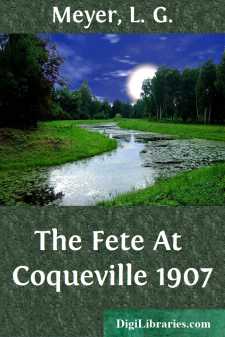Categories
- Antiques & Collectibles 13
- Architecture 36
- Art 48
- Bibles 22
- Biography & Autobiography 813
- Body, Mind & Spirit 142
- Business & Economics 28
- Children's Books 14
- Children's Fiction 11
- Computers 4
- Cooking 94
- Crafts & Hobbies 4
- Drama 346
- Education 46
- Family & Relationships 57
- Fiction 11829
- Games 19
- Gardening 17
- Health & Fitness 34
- History 1377
- House & Home 1
- Humor 147
- Juvenile Fiction 1873
- Juvenile Nonfiction 202
- Language Arts & Disciplines 88
- Law 16
- Literary Collections 686
- Literary Criticism 179
- Mathematics 13
- Medical 41
- Music 40
- Nature 179
- Non-Classifiable 1768
- Performing Arts 7
- Periodicals 1453
- Philosophy 64
- Photography 2
- Poetry 896
- Political Science 203
- Psychology 42
- Reference 154
- Religion 513
- Science 126
- Self-Help 84
- Social Science 81
- Sports & Recreation 34
- Study Aids 3
- Technology & Engineering 59
- Transportation 23
- Travel 463
- True Crime 29
The Fete At Coqueville 1907
by: L. G. Meyer
Description:
Excerpt
Coqueville is a little village planted in a cleft in the rocks, two leagues from Grandport. A fine sandy beach stretches in front of the huts lodged half-way up in the side of the cliff like shells left there by the tide. As one climbs to the heights of Grandport, on the left the yellow sheet of sand can be very clearly seen to the west like a river of gold dust streaming from the gaping cleft in the rock; and with good eyes one can even distinguish the houses, whose tones of rust spot the rock and whose chimneys send up their bluish trails to the very crest of the great slope, streaking the sky. It is a deserted hole. Coqueville has never been able to attain to the figure of two hundred inhabitants. The gorge which opens into the sea, and on the threshold of which the village is planted, burrows into the earth by turns so abrupt and by descents so steep that it is almost impossible to pass there with wagons. It cuts off all communication and isolates the country so that one seems to be a hundred leagues from the neighboring hamlets.
Moreover, the inhabitants have communication with Grandport only by water. Nearly all of them fishermen, living by the ocean, they carry their fish there every day in their barks. A great commission house, the firm of Dufeu, buys their fish on contract. The father Dufeu has been dead some years, but the widow Dufeu has continued the business; she has simply engaged a clerk, M. Mouchel, a big blond devil, charged with beating up the coast and dealing with the fishermen. This M. Mouchel is the sole link between Coque-ville and the civilized world.
Coqueville merits a historian. It seems certain that the village, in the night of time, was founded by the Mahés; a family which happened to establish itself there and which grew vigorous at the foot of the cliff. These Mahés continued to prosper at first, marrying continually among themselves, for during centuries one finds none but Mahés there. Then under Louis XIII appeared one Floche. No one knew too much of where he came from.. He married a Mahé, and from that time a phenomenon was brought forth; the Floches in their turn prospered and multiplied exceedingly, so that they ended little by little in absorbing the Mahés, whose numbers diminished until their fortune passed entirely into the hands of the newcomers. Without doubt, the Floches brought new blood, more vigorous physical organs, a temperament which adapted itself better to that hard condition of high wind and of high sea. At any rate, they are to-day masters of Coqueville.
It can easily be understood that this displacement of numbers and of riches was not accomplished without terrible disturbances. The Mahés and the Hoches detest each other. Between them is a hatred of centuries. The Mahés in spite of their decline retain the pride of ancient conquerors. After all they are the founders, the ancestors. They speak with contempt of the first Floche, a beggar, a vagabond picked up by them from feelings of pity, and to have given away one of their daughters to whom was their eternal regret. This Floche, to hear them speak, had engendered nothing but a descent of libertines and thieves, who pass their nights in raising children and their days in coveting legacies. And there is not an insult they do not heap upon the powerful tribe of Floche, seized with that bitter rage of nobles, decimated, ruined, who see the spawn of the bourgeoisie master of their rents and of their château. The Floches, on their side, naturally have the insolence of those who triumph. They are in full possession, a thing to make them insolent. Full of contempt for the ancient race of the Mahés, they threaten to drive them from the village if they do not bow their heads. To them they are starvelings, who instead of draping themselves in their rags would do much better to mend them.
So Coqueville finds itself a prey to two fierce factions—something like one hundred and thirty inhabitants bent upon devouring the other fifty for the simple reason that they are the stronger....


